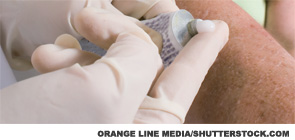
Rheumatologists are sometimes uncomfortable treating skin disease in their patients—but there’s inevitably a clinical situation in which a patient presents with a rash, and you think that a short course of topical steroids might help. You may be certain the rash is related to the patient’s condition or medications used for that condition, be it psoriasis, psoriatic arthritis, cutaneous lupus or dermatomyositis.
For example, when treating psoriatic arthritis, “Although systemic treatments can work in the skin, it’s not uncommon to have residual skin disease,” says dermatologist and rheumatologist Joseph F. Merola, MD, Brigham and Women’s Hospital, Harvard Medical School, Boston. “It’s great if the rheumatologist has some level of comfort with the appropriate use of topical steroids,” says Dr. Merola, who has instructed on the topic.
Perhaps the dermatologists in your area are extremely busy, or the patient does not want to be shuttled to different specialists. Or perhaps you want to offer the patient some relief while they wait to be seen by a local dermatologist.
Here’s some guidance on what to prescribe, possible side effects and when you should leave the diagnosis and treatment to a dermatologist.
What to Use
Topical corticosteroids range in potency from 1 to 7. Over-the-counter topicals have a potency of 7, at the lowest possible range. The highest potency topicals have a 1 ranking.
Rheumatologists should get to know one mild, one moderate and one potent topical treatment, Dr. Merola advises. One online resource that may help is the Topical Steroids Potency Chart, published by the National Psoriasis Foundation.
There are three specific steroids that dermatologist Ellen Frankel, MD, Rejuviderm MediSpa, Cranston, R.I., feels comfortable with nondermatologists prescribing: desonide (class 6), triamcinolone (class 4) or a short burst of clobetasol, which is a more potent therapy (class 1). A report in the January 2015 issue of Dermatologic Clinics focusing on topical therapies for psoriasis reported that clobetasol spray allows patients to apply steroids in areas that may be difficult to reach and may be more potent than the ointment formulation.1 Additionally, clobetasol propionate and betamethasone valerate in foam formulations dry rapidly, with little residue left on the skin.1
Topical steroids range in formulation from gels to liquids to ointments, the latter being the strongest, says Kate Ross, MD, LA Plastic Surgery and Dermatology, Bradenton, Fla. Each formulation has its advantages, depending on where it is used on the body, greasiness and ease of application, according to a paper on topical corticosteroids coauthored by Dr. Ross.2


